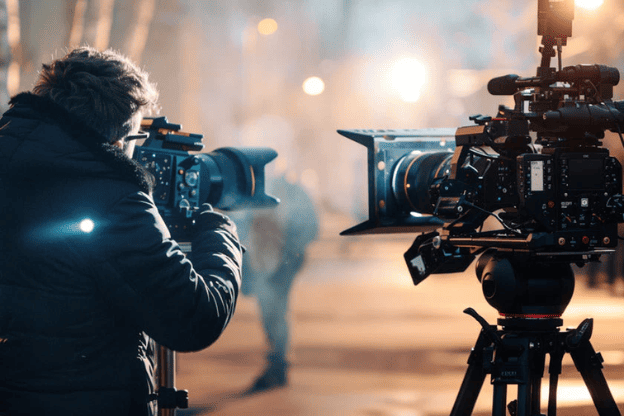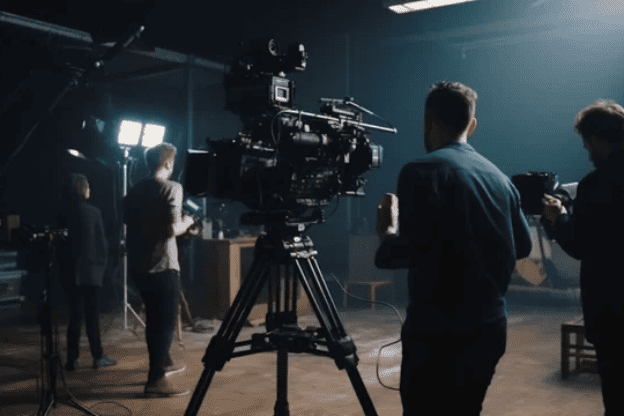Table of Contents
| Introduction |
| Why Choose Filmmaking as a Career?
|
| The Essence of a Filmmaking Course |
| Key Modules Covered in a Filmmaking Course |
| Skills You Develop as a Filmmaking Student |
| Career Opportunities After a Filmmaking Course |
| The Role of Technology in Modern Filmmaking |
| Why Choose a Professional Institute for Filmmaking? |
| Success Stories and Industry Relevance |
| Conclusion |
Introduction
Cinema is often described as the most powerful art form of the modern age. From the magical black-and-white frames of Charlie Chaplin to today’s high-tech cinematic universes, filmmaking has evolved into a dynamic blend of creativity, storytelling, and technology. Behind every masterpiece lies not just imagination but also skill, technique, and a strong understanding of film as a medium.
Why Choose Filmmaking as a Career?
Filmmaking is more than just pointing a camera—it is about bringing stories to life. It’s a career that combines artistic vision, technical expertise, and leadership skills. Here are a few reasons why filmmaking attracts countless enthusiasts:
- Global Demand: With the rise of streaming platforms like Netflix, Amazon Prime, and Disney+, the need for filmmakers has skyrocketed.
- Creative Expression: Filmmaking allows you to explore diverse cultures, emotions, and ideas.
- Diverse Career Roles: From directing to editing, sound design to screenwriting, the industry offers multiple career paths.
- Impactful Storytelling: Films have the power to influence society, spread awareness, and leave a legacy.
If you are passionate about telling stories and making a mark in the world of visual art, filmmaking is the right career path for you.
The Essence of a Filmmaking Course
A filmmaking course is not just about teaching the technicalities of cameras or software. It’s a comprehensive program that nurtures your creativity while instilling professional discipline.
Such courses provide:
- Theoretical Knowledge: Understanding film history, genres, and techniques.
- Practical Training: Hands-on workshops with cameras, editing suites, and sound equipment.
- Collaborative Projects: Real-world simulations where students create short films or documentaries.
- Industry Exposure: Masterclasses by filmmakers, on-set visits, and internships.
- Networking Opportunities with Filmmakers and Producers
Key Modules Covered in a Filmmaking Course
A well-designed filmmaking curriculum balances creativity with technical expertise. Let’s break down the essential modules:
- Scriptwriting and Storytelling
- Direction and Cinematic Vision
- Cinematography and Camera Techniques
- Editing and Post-Production
- Sound Design and Music
- Production Design and Art Direction
- Film Marketing and Distribution
Skills You Develop as a Filmmaking Student
A filmmaking course doesn’t just teach film—it transforms your personality. Skills developed include:
- Creative Thinking and Problem-Solving
- Technical Proficiency (cameras, editing software, sound equipment).
- Teamwork and Leadership
- Communication and Collaboration
- Time and Budget Management
- Critical Analysis and Research Skills
These skills are transferable, making students not just better filmmakers but also adaptable professionals in related industries like advertising, media, and digital content creation.
Career Opportunities After a Filmmaking Course
The film industry is vast, and opportunities are endless. Graduates can explore roles such as: Film Director
Cinematographer / Director of Photography
Screenwriter
Film Editor
Sound Designer
Art Director / Production Designer
Producer
Film Critic or Journalist
Visual Effects (VFX) Specialist OTT & Digital Content Creator
Additionally, the rise of independent cinema and short film culture has opened doors for young filmmakers to showcase their talent globally.
Why Choose a Professional Institute for Filmmaking?
While passion is crucial, structured learning provides an edge. A professional institute offers:
- Experienced Faculty: Industry experts with real-world knowledge.
- Hands-On Training: Access to studios, cameras, and editing labs.
- Networking Opportunities: Collaborations with peers and professionals.
- Internships and Placements: Entry points into the industry.
- Creative Environment: Exposure to multiple art forms and genres.
An institute acts as a launchpad, ensuring students are job-ready and creatively confident.
The Role of Technology in Modern Filmmaking
Filmmaking today is inseparable from technology. From 4K cameras and drones to AI-driven editing tools and virtual production techniques, the industry is constantly evolving.
Courses train students to stay updated with:
- DSLR & Digital Cinema Cameras (RED, ARRI, Blackmagic)
- Editing Software (Adobe Premiere Pro, Final Cut Pro, DaVinci Resolve)
- Sound Mixing Tools (Pro Tools, Logic Pro)
- VFX & CGI Tools (After Effects, Blender, Maya)
- Virtual Reality (VR) & Augmented Reality (AR) Storytelling
- Anchoring & Hosting
Why Choose a Professional Institute for Filmmaking?
While passion is crucial, structured learning provides an edge. A professional institute offers:
- Experienced Faculty: Industry experts with real-world knowledge.
- Hands-On Training: Access to studios, cameras, and editing labs.
- Networking Opportunities: Collaborations with peers and professionals.
- Internships and Placements: Entry points into the industry.
- Creative Environment: Exposure to multiple art forms and genres.
Conclusion
A filmmaking course is not just about learning how to shoot or edit—it is about discovering your unique voice as a storyteller. It equips you with technical mastery, creative confidence, and industry readiness.
If you dream of making films that inspire, entertain, and leave an impact, then enrolling in a filmmaking course could be your first step toward turning that dream into reality.



